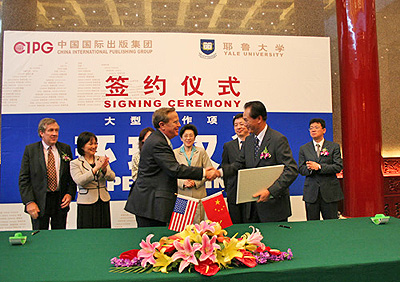
President of Yale University Richard Levin (L) and CIPG President Cai Mingzhao signed the cooperation agreement of I Speak Chinese in Beijing on May 17th
A large-scale series of Chinese language textbooks are to be published in the coming years jointly by the China International Publishing Group (CIPG) and Yale University, the first venture of this kind by a Chinese publication institute and a leading foreign university.
The set of textbooks, named I Speak Chinese, are expected to confirm the leading status of Yale and CIPG in Chinese language teaching publications and circulation in the world, said Richard Levin, President of Yale University, at the signing ceremony of the cooperation agreement held in Beijing on May 17th.
Expressing his confidence in the market prospects of the series, Cai Mingzhao, Vice Minister of the State Council Information Office and President of CIPG, said that CIPG and Yale are engaged to establish a unified and global brand in Chinese language learning.
This is just one example of the flourishing Chinese language textbook publication industry in the country boosted by the rising interest in the Chinese language among foreigners all over the world.
Global demand for Chinese
According to China's Ministry of Education, more than 30 million foreigners are learning Chinese and over 2,500 universities in 100 countries are offering Chinese courses. Statistics show that the number of foreign students coming to China has increased by 20 percent in the past five years.
A report by the U.S. Census Bureau shows that Chinese has become the second foreign language most spoken in the United States, after Spanish. According to a survey conducted by the Asia Society of the United States, students in U.S. kindergartens, high schools and universities are showing a "rapidly growing" interest in learning Chinese.
Europe is also seeing a wave of interest in people eager to dive into the mysteries of the Chinese language. In London, parents of most non-Chinese students studying the Chinese language work in the financial sector. They are aware of the impacts China is having on world markets and are making preparations to be part of the opportunities in the future, local observers said.
The London-based Hong kong and Shanghai Banking Corp. has invested a great deal of money since 2001 to fund Chinese language education projects in Britain organized by the British Cultural Committee. In a bizarre bout of promotion, British linguists are even advising their students, "If you want to be a future leader, learn Chinese."
In France, the number of people learning Chinese is increasing. Currently, there are some 20,000 French learning Chinese. The annual growth rate of the training market of English, Japanese and Spanish is 2-4 percent, while the yearly growth rate for Chinese training is 38 percent. Even former French President Jacques Chirac is on record as saying that learning Chinese is a good language choice for the French.
The situation in Asia is even more astounding. Nowadays, young people in South Korea purportedly have to attain a certain command of Chinese if they hope to find a job in large organizations, even if they hold a doctorate from a leading U.S. university. Chinese is the most popular foreign language among South Korean students and an optional subject for the college entrance exams.
| 